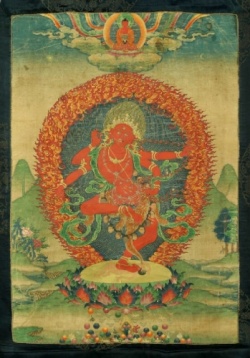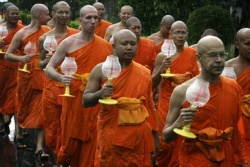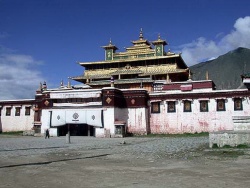Difference between revisions of "Pabbatopama Sutta"
m (Adminos moved page SN 3.25 Pabbatopama Sutta to Pabbatopama Sutta over redirect) |
|||
| (4 intermediate revisions by one other user not shown) | |||
| Line 1: | Line 1: | ||
| − | Irresistible Force | + | {{DisplayImages|1964|2188|3286}} |
| − | + | {{Centre|{{Big2x|Irresistible Force }}<br/> | |
| − | translated from the Pali by | + | translated from the [[Pali]] by <br/> |
| − | + | Andrew Olendzki}}<br/><br/> | |
| − | Andrew Olendzki | + | <poem> |
| − | |||
Just as a mighty mountain range, | Just as a mighty mountain range, | ||
Scraping the sky with rocky crags, | Scraping the sky with rocky crags, | ||
| − | Might advance from four directions, | + | Might advance from four [[directions]], |
Crushing everything before it — | Crushing everything before it — | ||
| − | So also do old age and death | + | So also do [[old age]] and [[death]] |
| − | Roll over all living beings. | + | Roll over [[all living beings]]. |
| − | Nobles, brahmans and working folk, | + | [[Nobles]], [[brahmans]] and working {{Wiki|folk}}, |
| − | Peasants, outcastes and garbage men — | + | Peasants, {{Wiki|outcastes}} and garbage men — |
None of them can escape [this end]: | None of them can escape [this end]: | ||
Everybody surely gets crushed. | Everybody surely gets crushed. | ||
| − | Nothing on earth can defeat them: | + | Nothing on [[earth]] can defeat them: |
| − | Not elephants, chariots or troops; | + | Not [[elephants]], chariots or troops; |
| − | Nor the use of a magic spell; | + | Nor the use of a [[magic]] spell; |
| − | Nor [can you buy safety] with gold | + | Nor [can you buy safety] with {{Wiki|gold}}. |
| − | |||
| − | |||
| − | |||
| − | |||
| − | |||
| − | + | So the [[person]] who's firm and [[wise]], | |
| − | + | [[Seeing]] what is best for themselves, | |
| − | + | Will place their [[faith]] in the [[Buddha]], | |
| − | + | The [[Dhamma]] and the [[Sangha]] too. | |
| + | One who practices the [[teaching]], | ||
| + | With [[body]] and {{Wiki|speech}} and with [[mind]] — | ||
| + | That one is praised here in this [[world]], | ||
| + | And after enjoys the [[pure realms]]. | ||
| + | </poem> | ||
==Translator's note== | ==Translator's note== | ||
| − | This verse emerges from a discussion between the Buddha and the Kosala king Pasenadi, who generally feels secure behind his four-fold army (elephant, chariot, cavalry and infantry divisions), his conjurers and his treasury. The Buddha asks him to imagine a situation — the fantastic closing-in of four mountain ranges — where all his royal resources will not help him meet the foe. | + | This verse emerges from a [[discussion]] between the [[Buddha]] and the [[Kosala]] [[king]] [[Pasenadi]], who generally [[feels]] secure behind his four-fold {{Wiki|army}} ([[elephant]], chariot, cavalry and infantry divisions), his conjurers and his treasury. The [[Buddha]] asks him to [[imagine]] a situation — the fantastic closing-in of four {{Wiki|mountain ranges}} — where all his {{Wiki|royal}} resources will not help him meet the foe. |
| − | Such is the situation in which we actually all find ourselves — rich or poor, aristocrat or laborer — though we are reluctant to face it. How do we respond to the inevitable onslaught of aging and death? The answer given in the body of the sutta is "What else is there to do, save to live righteously and justly and to work good and meritorious deeds?" The verse summarizes this phrase by saying one should have confidence (another way of translating the word saddham ) in the triple gem and practice the Buddha's teaching. | + | Such is the situation in which we actually all find ourselves — rich or poor, aristocrat or laborer — though we are reluctant to face it. How do we respond to the inevitable onslaught of [[aging]] and [[death]]? The answer given in the [[body]] of the [[sutta]] is "What else is there to do, save to live righteously and justly and to work good and [[meritorious]] [[deeds]]?" The verse summarizes this [[phrase]] by saying one should have [[confidence]] (another way of translating the [[word]] saddham ) in the [[triple gem]] and [[practice]] the [[Buddha's teaching]]. |
| − | Ever practical, the Buddha often points out that in this way we are covering our bets: there are immediate benefits in this life, and in the next our chances are better of emerging well-off. | + | Ever {{Wiki|practical}}, the [[Buddha]] often points out that in this way we are covering our bets: there are immediate benefits in this [[life]], and in the next our chances are better of [[emerging]] well-off. |
{{R}} | {{R}} | ||
[http://www.dhammawiki.com/index.php?title=Category:Samyutta_Nikaya dhammawiki.com] | [http://www.dhammawiki.com/index.php?title=Category:Samyutta_Nikaya dhammawiki.com] | ||
| − | [[Category: | + | [[Category:Saṃyutta Nikāya]] |
Latest revision as of 07:29, 9 March 2015
Irresistible Force
translated from the Pali by
Andrew Olendzki
Just as a mighty mountain range,
Scraping the sky with rocky crags,
Might advance from four directions,
Crushing everything before it —
So also do old age and death
Roll over all living beings.
Nobles, brahmans and working folk,
Peasants, outcastes and garbage men —
None of them can escape [this end]:
Everybody surely gets crushed.
Nothing on earth can defeat them:
Not elephants, chariots or troops;
Nor the use of a magic spell;
Nor [can you buy safety] with gold.
So the person who's firm and wise,
Seeing what is best for themselves,
Will place their faith in the Buddha,
The Dhamma and the Sangha too.
One who practices the teaching,
With body and speech and with mind —
That one is praised here in this world,
And after enjoys the pure realms.
Translator's note
This verse emerges from a discussion between the Buddha and the Kosala king Pasenadi, who generally feels secure behind his four-fold army (elephant, chariot, cavalry and infantry divisions), his conjurers and his treasury. The Buddha asks him to imagine a situation — the fantastic closing-in of four mountain ranges — where all his royal resources will not help him meet the foe.
Such is the situation in which we actually all find ourselves — rich or poor, aristocrat or laborer — though we are reluctant to face it. How do we respond to the inevitable onslaught of aging and death? The answer given in the body of the sutta is "What else is there to do, save to live righteously and justly and to work good and meritorious deeds?" The verse summarizes this phrase by saying one should have confidence (another way of translating the word saddham ) in the triple gem and practice the Buddha's teaching.
Ever practical, the Buddha often points out that in this way we are covering our bets: there are immediate benefits in this life, and in the next our chances are better of emerging well-off.


